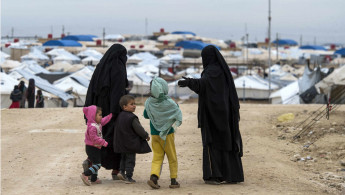Grandparents hope to repatriate French children suffering in Syrian camps
The boy's mother, Julie Maninchedda, is a suspected French female jihadi fighter killed five months ago during shelling on a former Islamic State group stronghold. Their father is a captured German.
The maternal grandparents of the children are now trying to bring them to France, appealing to President Emmanuel Macron to show "humanity" and accept the children immediately.
They are fighting an uphill battle, supported by local media, to repatriate their three grandchildren, which they have never met.
The youngest boy Suleiman, aged-one, and his brother, Shahir, aged-three, live in Kurdish-run al-Hol camp, where tens of thousands displaced Syrians live alongside relatives of suspected IS fighters.
"It is overwhelming to find them," Julie Maninchedda’s mother told France Bleu radio, "like all grandparents, we want to see our grandchildren. They need to be reintegrated into a normal life and family".
More than 2,500 foreign children from over 30 nationalities are living in Kurdish-run camps, according to Save the Children, and nearly 40 are living without their parents.
Maninchedda and Lemke
Maninchedda was killed along with her second husband, a Moroccan IS fighter, in October when shelling hit the village of al-Shaafa in eastern Syria, two women who were in the area during the attack told AFP.
At the time of her death, she had been separated for several months from her first husband and the father of the three boys, Martin Lemke, a German jihadi who travelled with her to Syria in 2014.
The three boys were separated upon the departure of Lemke, who took the eldest Hassan, aged-five, with him alongside his two other wives and their three children. The family surrendered in late January after fleeing the besieged village of Baghouz, the last territory held by IS.
Lemke, suspected of having worked with IS intellgience, was sent to a Kurdish-run detention centre and his wives and children were brought to displacement camps.
AFP met Lemke's wives this month at a screening point outside Baghouz. They said they had entrusted Shahir and Suleiman to a Syrian woman after the death of Maninchedda, who then brought them with her to al-Hol.
The two boys are now being looked after by two other women detained in the shelter, a South African and a German, who are suspected of joining IS.
Terrible Conditions
Nadim Houry, of Human Rights Watch (HRW), who met Suleiman and Shahir in al-Hol early this month said they were physically abused by the Syrian woman.
Suleiman does not work nor speak and Shahir, who is extremely thin and frail, struggles with recurrent stomach ages, Houry told AFP.
"The freezing cold, the rain, the wind, overcrowding and the lack of follow-up, makes living conditions in the camp especially atrocious for young children," said Houry.
"Show a little humanity"
Meanwhile in France, Lydie Maninchedda, who learned last month from an anonymous message that her only daughter Julie had died in Syria, is urging the government to repatriate the three children to France.
Along with her husband Patrice, she wrote to Macron to ask him to "show a little humanity".
"God knows what they have lived," she told AFP.
"But they are very small, they have not done anything, we have to give them a chance to rebuild themselves, to have a life."
France has said that it is considering transporting children held in Syria, starting with those who lost parents, but the authorities have not given a timeline.
Almost three-quarters of French nationals in Syria are children under the age of seven, according to French Justice Minister Nicole Belloubet.
Lydie Maninchedda is also campaigning for adults to return to France.
"Why did 1,700 French people go there? I do not know why France does not want to answer this question."





 Follow the Middle East's top stories in English at The New Arab on Google News
Follow the Middle East's top stories in English at The New Arab on Google News
![Israeli forces ordered bombed Gaza's Jabalia, ordering residents to leave [Getty]](/sites/default/files/styles/image_330x185/public/2176418030.jpeg?h=a5f2f23a&itok=_YGZaP1z)

